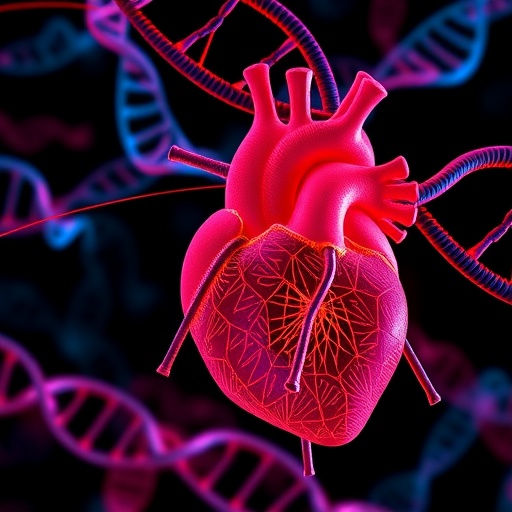In a groundbreaking leap for cardiovascular medicine, the fusion of artificial intelligence (AI), omics technologies, and systems biology is propelling the design of precision-targeted drugs against pathways of cardiovascular disease once dismissed as untreatable. This fusion marks a paradigm shift, challenging the traditional one-size-fits-all drug development model and heralding personalized therapies tailored to individual biological signatures.
This transformative perspective is articulated in a seminal article recently published in Frontiers in Science, where a team of interdisciplinary researchers elucidates how integrating these advanced scientific tools can revolutionize heart disease treatment. The article underscores the potential to decipher the complex molecular and genetic underpinnings of cardiovascular disorders—enabling unprecedented specificity in therapeutic targeting and improving patient outcomes at a global scale.
Artificial intelligence stands at the forefront of this innovation, offering powerful computational methods to analyze vast datasets derived from genomics, proteomics, metabolomics, and other omics disciplines. AI algorithms excel in identifying hidden patterns and predictive markers in heterogeneous patient populations, thereby streamlining the drug discovery pipeline. By dissecting multifaceted biochemical networks, AI facilitates drug candidates that precisely interact with disease-relevant molecular nodes, maximizing efficacy while minimizing adverse effects.
Omics technologies provide the foundational data enabling this precision approach by offering a comprehensive snapshot of the biological landscape within individual patients. Genomic sequencing reveals mutations and polymorphisms linked to cardiovascular risk, while transcriptomics and proteomics elucidate the dynamic expression profiles of genes and proteins implicated in pathological processes like atherosclerosis and myocardial infarction. Metabolomics complements these by mapping biochemical intermediates and pathways perturbed in disease states, effectively constructing a molecular atlas of cardiovascular pathology.
Systems biology integrates these diverse data streams into holistic models that simulate biological systems and their responses to therapeutic interventions. By adopting a network-based perspective, systems biology uncovers emergent properties and feedback loops within cardiovascular signaling pathways that are otherwise imperceptible via conventional reductionist research. These insights enable researchers to predict potential off-target effects and optimize multi-target drug regimens, driving the transition from empirical drug design to mechanism-driven development.
Yet, as the article emphasizes, transformative scientific advances alone cannot fulfill the promise of precision cardiovascular medicine. The authors advocate a radical overhaul in drug development strategies encompassing not only molecular ingenuity but also holistic policy frameworks. They argue for global, equitable health policy leadership to ensure that innovations translate into accessible treatments for diverse populations, including those in low- and middle-income countries disproportionately burdened by cardiovascular disease.
Recognizing the urgency of this challenge, the researchers call for intensified interdisciplinary and intersectoral collaboration. They underscore the importance of fostering partnerships among bioengineers, data scientists, clinicians, policymakers, and industry stakeholders. Such collaboration is deemed essential to catalyze shared data infrastructures, harmonize regulatory standards, and secure sustainable funding mechanisms critical for accelerating translational research and clinical adoption.
In a forthcoming Frontiers Forum Deep Dive webinar scheduled for 17 November 2025, leading experts Prof. Masanori Aikawa, Prof. Joseph Loscalzo, Dr. Chiara Giannarelli, and Prof. Jean-Luc Balligand will explore these themes in depth. The event is poised to spotlight strategic approaches to engaging policymakers, advocating for robust investment, and shaping adaptable regulatory environments supportive of AI-driven precision therapeutics.
The webinar aims to galvanize the scientific and public health communities around a unified vision: leveraging cutting-edge AI and multi-omics insights to dismantle entrenched barriers in cardiovascular medicine. Moving beyond generalized treatment algorithms, precision medicine promises bespoke drug regimens reflecting patient-specific molecular profiles, ultimately improving survival rates and quality of life in one of the world’s leading causes of mortality.
Ultimately, the integration of AI, omics, and systems biology exemplifies the next frontier in cardiovascular drug discovery, transforming once “untreatable” pathways into viable therapeutic targets. This convergence signifies not only a scientific revolution but a clarion call for strategic policy action to democratize the benefits of innovation worldwide.
As cardiovascular disease remains a global health menace, this synthesis of technology and collaboration charts a hopeful trajectory toward more effective, inclusive, and equitable heart care. The time is ripe to transcend traditional paradigms and embrace precision cardiovascular medicine as the standard-bearer for future therapeutic breakthroughs.
Subject of Research: Precision cardiovascular medicine leveraging artificial intelligence, omics, and systems biology.
Article Title: Precision cardiovascular medicine: shifting the innovation paradigm.
News Publication Date: 2025.
Web References: https://www.frontiersin.org/journals/science/articles/10.3389/fsci.2025.1474469/full
References: DOI 10.3389/fsci.2025.1474469
Keywords: Personalized medicine, cardiovascular disease, cardiology, systems biology, health care policy, artificial intelligence, omics, big data




